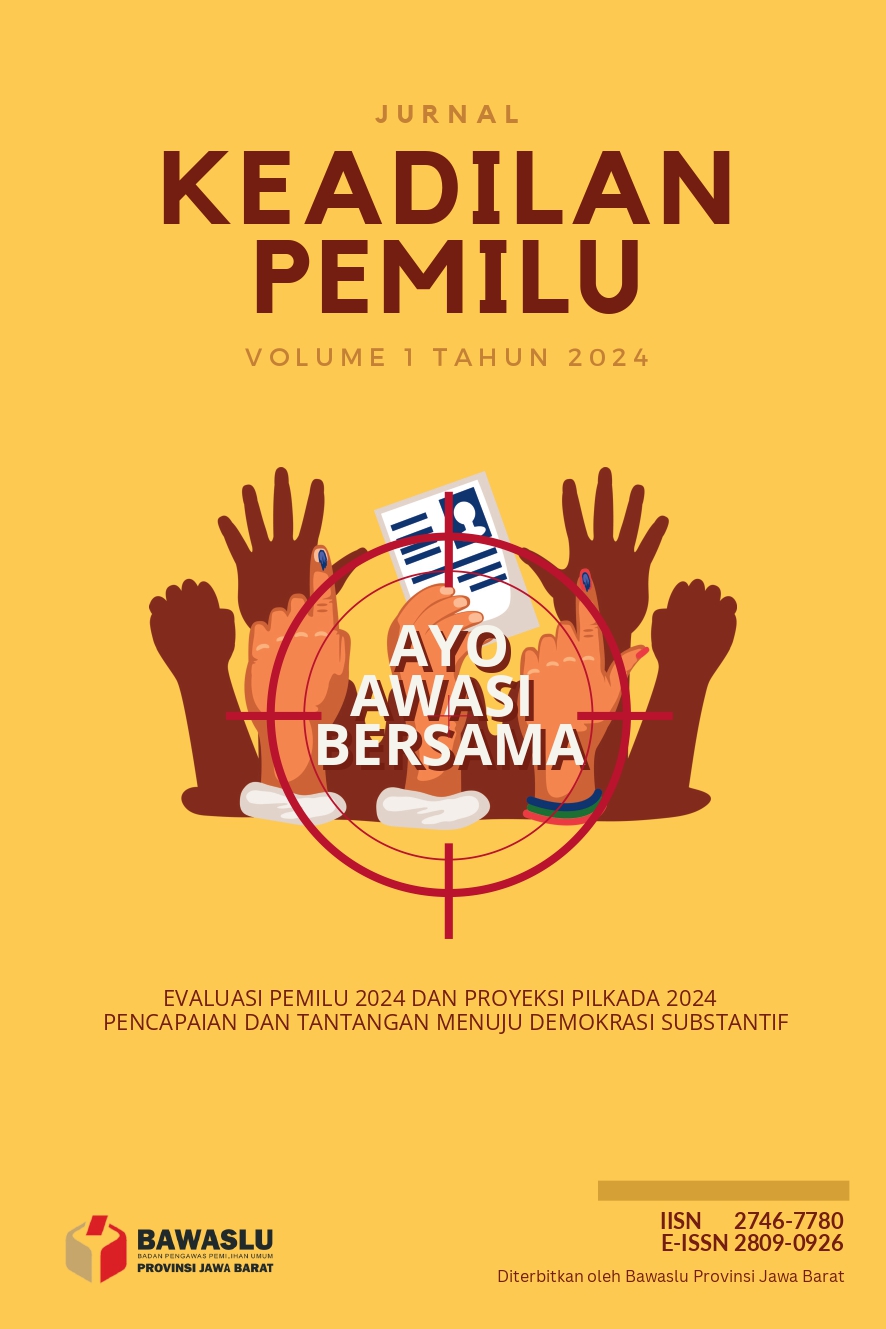PENGUATAN INTEGRITAS PEMILU: PENDEKATAN INOVATIF MEMANFAATKAN MESIN PEMBELAJARAN UNTUK MENDETEKSI KECURANGAN
DOI:
https://doi.org/10.55108/jkp.v5i1.434Kata Kunci:
Integritas Pemilu, Transparansi, PemantauanAbstrak
This study explores the development and implementation of machine learning (ML) models designed to detect patterns indicating electoral fraud. The aim of this study is to address existing gaps in the literature by integrating advanced ML algorithms, leveraging various data sources, developing real-time monitoring systems, ensuring model transparency, and addressing ethical considerations. The main argument is that ML provides a robust and adaptive approach to enhance the accuracy and efficiency of detecting electoral fraud. This research employs a comprehensive analysis using Systems Theory to integrate and optimize the various components involved in detecting electoral fraud. The study also develops real-time monitoring systems and incorporates methods for model interpretability and transparency. Ethical and practical challenges are addressed through thorough analysis and the provision of guidelines for responsible implementation. The study demonstrates that machine learning significantly improves the detection of electoral fraud by identifying complex and subtle patterns that may be overlooked by traditional methods. The integration of various data sources and real-time monitoring enhances the resilience and timeliness of fraud detection. Ensuring model transparency and addressing ethical considerations helps build trust and accountability in the electoral process. Overall, this research provides a comprehensive solution that enhances the accuracy, efficiency, and trust in detecting electoral fraud, thereby supporting the integrity of the democratic process.
Referensi
Zelizer, Julian E., and Karen J. Greenberg, eds. Our Nation at Risk: Election Integrity as a National Security Issue. NYU Press, 2024.
Mauk, Marlene. "Electoral integrity matters: how electoral process conditions the relationship between political losing and political trust." Quality & Quantity 56, no. 3 (2022): 1709-1728. https://doi.org/10.1007/s11135-020-01050-1
Idrobo, Nicolás, Dorothy Kronick, and Francisco Rodríguez. "Do shifts in late-counted votes signal fraud? Evidence from Bolivia." The Journal of Politics 84, no. 4 (2022): 2202-2215. https://doi.org/10.1086/719639
Vimbi, Viswan, Noushath Shaffi, and Mufti Mahmud. "Interpreting artificial intelligence models: a systematic review on the application of LIME and SHAP in Alzheimer's disease detection." Brain Informatics 11, no. 1 (2024): 10. https://doi.org/10.1186/s40708-024-00222-1
Barber, Michael, and John B. Holbein. "400 million voting records show profound racial and geographic disparities in voter turnout in the United States." Plos one 17, no. 6 (2022): e0268134. https://doi.org/10.1371/journal.pone.0268134
Kostelka, Filip, and André Blais. "The generational and institutional sources of the global decline in voter turnout." World politics 73, no. 4 (2021): 629-667. https://doi.org/10.1017/S0043887121000149
Cravens, Matthew D. "Measuring the strength of voter turnout habits." Electoral Studies 64 (2020): 102117. https://doi.org/10.1016/j.electstud.2020.102117
Ansolabehere, Stephen, Bernard L. Fraga, and Brian F. Schaffner. "The current population survey voting and registration supplement overstates minority turnout." The Journal of Politics 84, no. 3 (2022): 1850-1855. https://doi.org/10.1086/717260
Velasco, Rafael B., Igor Carpanese, Ruben Interian, Octavio CG Paulo Neto, and Celso C. Ribeiro. "A decision support system for fraud detection in public procurement." International Transactions in Operational Research 28, no. 1 (2021): 27-47. https://doi.org/10.1111/itor.12811
Ahn, Byeongtae. "Implementation and early adoption of an ethereum-based electronic voting system for the prevention of fraudulent voting." Sustainability 14, no. 5 (2022): 2917. https://doi.org/10.3390/su14052917
Santos, Jéssica S., Flavia Bernardini, and Aline Paes. "A survey on the use of data and opinion mining in social media to political electoral outcomes prediction." Social Network Analysis and Mining 11, no. 1 (2021): 103. https://doi.org/10.1007/s13278-021-00813-4
Canon, David T., and Owen Sherman. "Debunking the "big lie": Election administration in the 2020 presidential election." Presidential Studies Quarterly 51, no. 3 (2021): 546-581. https://doi.org/10.1111/psq.12721
Aslam, Nida, Irfan Ullah Khan, Samiha Mirza, Alanoud AlOwayed, Fatima M. Anis, Reef M. Aljuaid, and Reham Baageel. "Interpretable machine learning models for malicious domains detection using explainable artificial intelligence (XAI)." Sustainability 14, no. 12 (2022): 7375. https://doi.org/10.3390/su14127375
Long, James D. "Protecting Electoral Integrity in Emerging Democracies." Temina Madon· Ashok J. Gadgil Editors Richard Anderson· Lorenzo Casaburi (2023): 489. https://doi.org/10.1007/978-3-030-86065-3_18
Cordero, Carrie. "How Cybersecurity Saved US Democracy." Horizons: Journal of International Relations and Sustainable Development 20 (2022): 12-23.
Hayati, Neni Nur. "Urgensi Pelibatan Generasi Muda Dalam Pengawasan Partisipatif Untuk Pemilu Serentak Tahun 2024 Yang Demokratis." Jurnal Keadilan Pemilu 2, no. 1 (2021): 23-34. https://doi.org/10.55108/jkp.v2i1.143
Kurnia, Yusup. "Analisis Hukum Penyertaan "Dellneming" dalam Penegakan Hukum Pidana Pemilu: Evaluasi Pemilu 2019 dan Proyeksi Pemilu 2024." Jurnal Keadilan Pemilu 2, no. 2 (2021): 61-74. https://doi.org/10.55108/jkp.v2i2.138
Unduhan
Diterbitkan
Cara Mengutip
Terbitan
Bagian
Lisensi
Hak Cipta (c) 2024 Rita Komalasari, Cecep Mustafa

Artikel ini berlisensi Creative Commons Attribution 4.0 International License.




